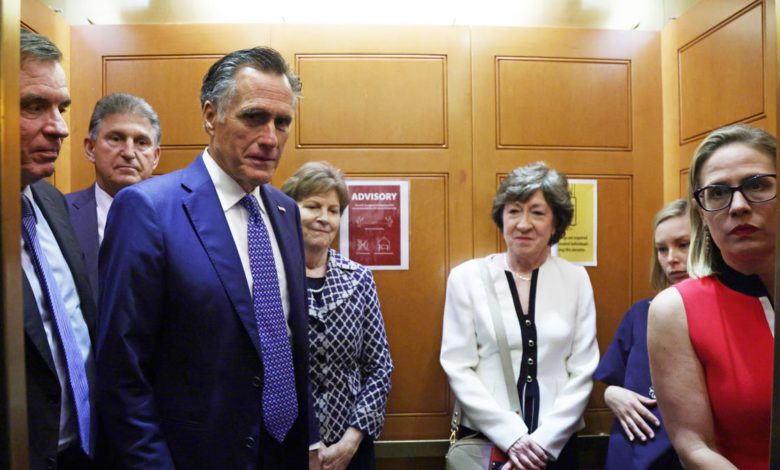
WASHINGTON — President Joe Biden's administration isn't giving up on a bipartisan infrastructure deal after talks with Republican senators collapsed and expressed openness to a strategy from Senate Democrats to pass certain components of the measure without Republicans support.
Weeks of negotiations resulted in little headway, with major differences on costs and taxes going unreconciled. Republicans accused the president of changing his demands and being unwilling to compromise on his insistence on "social infrastructure" while the White House said the Republicans' offers didn't meet America's needs.
But the White House claimed it still has "multiple paths forward" for getting an infrastructure bill passed, including using a special legislative maneuver that doesn't require Republican backing, a separate House Democratic proposal and a bipartisan group of senators who have been meeting this week on a compromise.
More: Biden ends infrastructure talks with GOP group of senators, pushes ahead with moderates
Biden opened talks with the group of around 20 senators that include Sens. Mitt Romney, R-Utah, Rob Portman, R-Ohio, Bill Cassidy, R-La., Joe Manchin, D-W.Va., and Kyrsten Sinema, D-Ariz.
"(The president is) quite familiar with the fact that it takes some patience at times, that there are going to be moments when we're near death and then it comes back," White House press secretary Jen Psaki told reporters on Air Force One as Biden flew to Europe on Wednesday. "That's always how policymaking, lawmaking, billmaking happens."
Talks underway with bipartisan group of senators
After Biden cut off negotiations with a group of Republicans led by Sen. Shelley Moore Capito of West Virginia on Tuesday, he turned to the bipartisan group of senators that started gathering in recent weeks to explore their own infrastructure proposals as Biden's other talks fizzled.

Biden spoke to Manchin, Sinema and Cassidy on Tuesday night. The White House said he will continue speaking to the group by phone while in Europe.
But as new negotiations begin, some of the same differences have already emerged over taxes to pay for infrastructure spending and components that stray beyond Republicans' view of traditional infrastructure like roads, bridges and railroads.
More: Biden offers to keep 2017 Trump tax cuts intact in infrastructure counteroffer to GOP
In his last infrastructure offer to Republicans, Biden reduced new spending to $1 trillion, down from the initial $2.25 trillion introduced in March with his American Jobs Plan.Capito and the GOP senators raised their counteroffer to $978 billion, but it included only around $300 billion new spending over already-approved funds, leaving a $700 billion difference with the president.
Portman, a negotiator in the group of senators Biden is working with now, said they are making progress, but did not disclose the cost of what they're they're exploring. He also set out similar parameters that led to disagreement with Biden in the previous talks, saying a package must involve only traditional physical infrastructure.
"Roads, bridges and hard assets, it's not social programs," Portman said.

Dooming previous negotiations, Republicans opposed any spending beyond roads, bridges, airports and other traditional physical infrastructure as Biden stayed committed to "social infrastructure" that includes caregiving for the disabled and elderly and investments to tackle climate change.
Romney said Democrats would likely have to pursue climate-change initiatives outside of an infrastructure bill. He also ruled out corporate tax increases that would rewind the 2017 tax cuts, as Biden proposed in his American Jobs Plan, and user fees, which Biden opposes.
"In our pay fors, there are no tax increases. And that's a red line for Republicans," Romney said.
White House open to reconciliation
If Biden doesn't reach an agreement, Democrats could choose to push through an infrastructure package using budget reconciliation, a legislative maneuver subject to certain rules that would allow the bill to pass with only a simple majority in the evenly divided Senate. In essence, it would allow Democrats, who control the chamber, to pass a proposal without any Republican support.
Senate Majority Leader Chuck Schumer said Senate Democrats are pursuing a "two-path proposal" that includes reconciliation. He floated a scenario in which Biden reaches a bipartisan deal on traditional infrastructure such as roads, bridges and broadband and Democrats try to pass another piece of legislation through reconciliation that would contain initiatives on which the two sides couldn't come to an agreement.

"It may well be that part of the bill that will pass will be bipartisan, part of it will be through reconciliation," Schumer said. "But we're not going to sacrifice the bigness and boldness in this bill. We will just pursue two paths and at some point they will join.”
Some Democrats, not convinced Republicans are serious about negotiations, have been advocating for this approach for weeks.
Psaki said Biden is open to Schumer's two-pronged strategy that includes reconciliation. She noted proposals in Biden's $1.8 trillion families plan such as extending child tax credits, universal prekindergarten and free community college are not among areas being negotiated with lawmakers.
"So that would be natural components that would be added to the budget process," she said.
The reconciliation process would mirror how Biden passed his COVID-19 rescue plan in March, but it carries risk because all 50 Democratic senators would need to be on board. Manchin, a key moderate swing vote, has not said whether he supports using reconciliation to pass an infrastructure bill.
More: Manchin's staunch opposition to ending filibuster puts Biden's agenda in jeopardy
House Democrats introduce their own infrastructure proposals
The White House has pointed to ongoing efforts in the House as another pathway for infrastructure. But one bill pushed by Democrats represents just a fraction of the spending Biden wants while another from a bipartisan group would face an uphill climb for support in the Senate.
On Wednesday, the House Transportation and Infrastructure Committee began taking up a five-year, $547 billion transportation bill known as the Invest in America Act that could turn into a vehicle for a Democrats-only infrastructure bill.
The measure includes earmarks, funding for specific projects usually inserted into broad spending bills by lawmakers.
House Republicans, who proposed a $400 billion package last month, oppose the measure. Only a fraction of the bill is made up of earmarks (roughly $5.7 billion) but there’s hope by the bill’s sponsors that it might help sway reluctant Republicans to support it.
Democrats and Republicans in the House who make up the Problem Solves Caucus unveiled their entry into the infrastructure sweepstakes: an eight-year, $1.25 trillion package that would modernize not only traditional transportation such as roads, bridges and rail but would also address broadband, veterans’ housing, electric vehicles and Superfund sites.

More: GOP senators pitch new $928 billion infrastructure plan in latest offer to Biden
The plan from the group of 58 lawmakers would rely on a combination of increased private partnerships to pay for the bill as well as some modest increases in revenue, such as indexing the current federal 18.4-cent per gallon gas tax to inflation and imposing a “modest” annual registration fee on fully electric and hybrid electric vehicles.
“It's critically important that we get a robust infrastructure package signed into law, and that we do it with strong bipartisan support,” said Problem Solvers Caucus Co-Chair Josh Gottheimer, D-N.J.
But illustrating the difficulty of reaching compromise, the Problem Solvers Caucus' plan calls for modest tax and revenue increases – tax hikes that go against what Republicans in the bipartisan group have said they would accept.
Reach Joey Garrison on Twitter @joeygarrison.
Published
Updated
Source link








